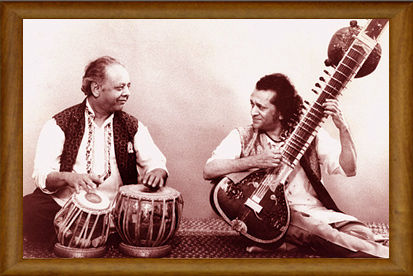Alla Rakha was born on April 29, 1919, at Phagwal village of Jammu, 80 kms from Lahore. Khan was fascinated with the sound of tabla since the age of 12, when he was staying with his uncle at Gurdaspur. The determined young lad ran away from house and became a disciple of Mian Qader Baksh of the Punjab Gharana, who initiated him into the world of music. He learnt 'Raag Vidya' from Ustad Ashiq Ali Khan of Patiala Gharana. His regimen of practice and dedication were the stuff of legend: hours upon hours of hard, disciplined practice cultivating his skills would eventually pay off.
He started his musical career as an accompanist in Lahore and then as an AlI India Radio staffer in Mumbai in 1940. Soon after he would compose music for a couple of Hindi films from 1943 onwards, by the name of A R Qureshi. The venerable master would later achieve world reknown as
Pandit Ravi Shankar's chief accompanist during his apex in the 1960s, delighting audiences in the West with his percussive wizardry, both as an uncanny accompanist with flawless timing and sensitivity as well as a soloist where he was a master of improvisation, a prolific composer and an electric showman. The Ustad popularized the art of tabla playing all over the globe, elevating the status and respect of his instrument.
He was married to Bavi Begum and their marriage produced three sons, Zakir Hussain, Fazal Qureshi and Taufiq Qureshi; two daughters, Khurshid Aulia née Qureshi and Razia; and nine grandchildren. They all survived him except Razia; it was the news of her death the day before that is thought to have caused his fatal heart attack.
Rakha popularized the art of tabla, playing across the globe, elevating the status and respect of his instrument. Abbaji, as he was known by his disciples, alos bridged the gap netween Carnatic music and Hindustani music by playing noth renowned Carnatic musicians and other Hindustani stalwarts.
Leading American percussionists in rock n' roll, such as the Grateful Dead's Mickey Hart, admired him and studied his technique, benefiting greatly even from single meetings. Hart, a published authority on percussion in world music, said: "Allah Rakha is the Einstein, the Picasso; he is the highest form of rhythmic development on this planet." Rakha also collaborated with jazz drummer Buddy Rich on their 1968 album Rich à la Rakha.
Rakha was part of the ensemble accompanying Ravi Shankar during George Harrison's Concert for Bangladesh shows, held in New York City in August 1971. The success of the live album and concert film from this event presented Indian classical music to a wide audience in the West. Rakha was awarded the Padma Shri in 1977 and the Sangeet Natak Akademi Award in 1982. He was also featured in a Google doodle on 29 April 2014 on the occasion of his 95th birthday.

